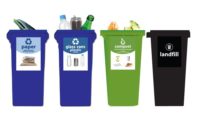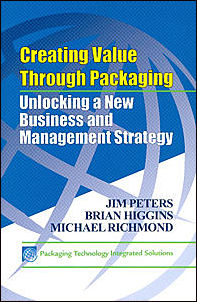James Cropper Launches Technology for Closed-Loop Recycling

James Cropper is to reprocess disposable coffee cups collected by environmental solutions provider Veolia from Selfridges’ Oxford Street headquarters and stores, with the resulting paper being used to create the retailer’s iconic yellow shopping bags in a completely unique closed-loop recycling solution.
Once used, disposable cups from the food hall and offices at the department store will be ‘tipped, flipped and stacked’ – a process to ensure any remaining liquid is drained and the lid, sleeve and cup are separated. Veolia then undertakes a further separation process to guarantee all rogue items have been removed. The cups are checked for quality, then baled and delivered to paper manufacturer James Cropper for reprocessing at its innovative CupCycling™ plant.
The disposable cups will be upcycled into paper that will then be converted into the yellow shopping bags, with the final product containing 20 percent cup fiber, meaning one large bag will contain the equivalent of one 8 oz. cup. The remaining paper fiber will continue to be PEFC-certified. The bags will display the CupCycling logo, verifying that the waste fiber has been processed through James Cropper’s unique facility, and after use will be able to be recycled in the standard paper waste stream.
It is estimated that 2.5 billion paper cups are used in the UK each year. Until recently, these were unable to be recycled due to their polyethylene lining; however, James Cropper’s facility, which was opened by HM the Queen in 2013, possesses the technology to separate the two components. The paper fibre is rescued and turned into luxury papers and the polyethylene is recycled into products such as plastic tubing and cable wraps.
Chris Brant, director of retail projects and FM at Selfridges, said: “As part of our ‘Buying Better, Inspiring Change’ approach, we are constantly looking for new ways to make our business more efficient. One way we’re doing this is by reducing the amount of single use plastics we use. In 2015, as part of our Project Ocean campaign with the Zoological Society of London, we removed plastic carrier bags, microbeads from our beauty hall and single-use plastic cups and bottles from our stores and back of house. As we are already at zero waste to landfill, we are looking at further innovative ways to capture and treat recyclable materials.
“With our partners James Cropper and Veolia, we can take coffee cups, a waste product of ours, and transform them into our yellow kraft bags, thereby closing the loop on that particular waste stream. Not only that, but the bags can still be recycled for years to come. We’re proud to be the first retailer to upcycle our cups in this way. Our customers are becoming ever more aware of global waste issues and I think they will appreciate the story behind the bag.”
James Cropper will be showcasing its CupCycling solution at the Luxury Packaging Innovations event taking place in London in September, where its global packaging director, Susan Wilson, will take part in a panel discussion on 'Packaging as Part of the Brand Story.' The discussion will be led by Vincent Villeger, a luxury packaging creative consultant and former director of packaging design at Burberry, with Susan being joined on stage by Abby Chicken, sustainability manager at Selfridges, for the Luxury Forum.
Steve Adams, managing director of James Cropper, said: “The fiber used to create paper cups is very high quality as only ‘virgin’ pulp is used to satisfy food contact requirements. Seeing this go to waste on such a huge scale is what inspired us to develop the technology to separate the two components. What we’re left with is material that’s virtually indistinguishable from fresh fiber and can therefore be used to create paper products of the highest quality, such as Selfridges’ bags.
“Our plant has so far recycled more than six million used cups – a figure that with partnerships like those with Selfridges, Veolia and others is expected to continue to rise. And we’re more than prepared to cope with such a boom, with the plant currently having the capacity to recycle 500 million paper cups each year. With CupCycling, we’re enabling brands to work with us towards a world that’s less wasteful and become part of a movement that has the potential to revolutionize paper cup recycling forever.”
Gavin Graveson, chief operating officer of public and commercial at Veolia UK, said: “This is a great example to show how coffee cups are being reused as part of the circular economy. I’d like to take this opportunity to further encourage a mass collaboration between designers, manufacturers, vendors and consumers as we all have a part to play in making all of our packaging more environmentally friendly and ensuring our resources are kept in the loop for longer.”
Looking for a reprint of this article?
From high-res PDFs to custom plaques, order your copy today!







